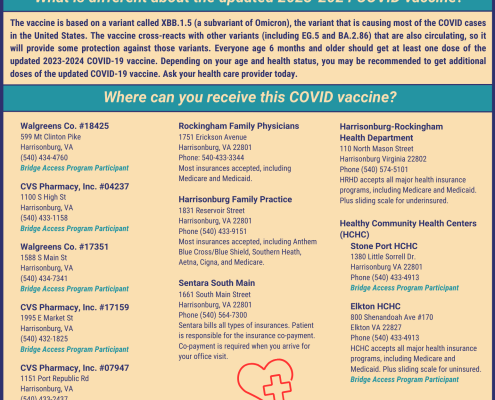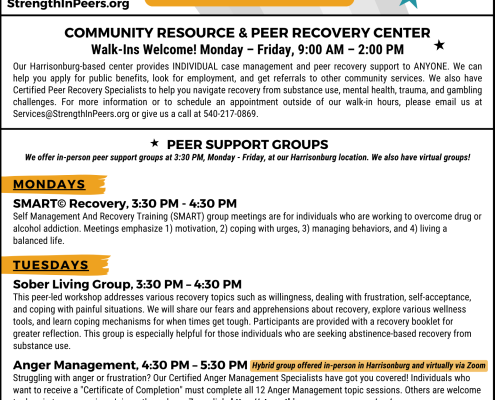Professional Development
Certified Peer Recovery Specialists (CPRS)
Certified Peer Recovery Specialists (CPRS) are credentialed individuals with lived experience in recovery or in supporting a family member or loved one(s) in recovery. CPRSs provide a unique, personal perspective and offer insight into the recovery process to aid those with similar experiences.
CPRSs help individuals achieve sustained recovery from the effects of substance use, mental health and trauma-related issues. CPRSs are not clinicians and do not replace other professional services. They serve in a supportive role within the recovery community, complementing the existing array of support services. Peer recovery is an evidence-based model.
Information regarding the CPRS process:
https://dbhds.virginia.gov/office-of-recovery-services/
https://www.vaprs.org/become-a-peer/
The Virginia Certification Board (VCB) Requirements for CPRS:
- Complete the DBHDS 72-hour Peer Recovery Specialist training
- Accumulate 500 hours of experience providing peer support services
- Pass a certification exam
- At least one year of recovery from mental health and/or substance use challenges or at least one year as a family member supporting a loved one with mental health and/or substance use challenges
- High school diploma/GED
- Agree to abide by a code of ethics
Peer Recovery Specialist (PRS) Trainings include 60 hours of contact time and 12 hours of outside homework, as well as quizzes and a final test. Upon successful completion of the training, you are eligible for certification as a Peer Recovery Specialist. The DBHDS 72-hour PRS training is the only training accepted by the Virginia Certification Board as part of the certification process.
Recertification: 20 hours of continuing education hours every two years, six of which need to be in ethics. For more information, visit the VCB website.
Registered Peer Recovery Specialists
Registered Peer Recovery Specialists (RPRS) are Certified Peer Recovery Specialists (CPRSs) whose services are billable by Medicaid. RPRSs must meet the requirements and apply through the Virginia Board of Counseling to ensure registration.
FAQ:
https://www.dhp.virginia.gov/counseling/docs/RPRS_FAQs.pdf
Application Handbook:
https://www.dhp.virginia.gov/Forms/counseling/Online_Application_Handbook_QMHP.pdf
National Certification Commission for Addiction Professionals – NCC AP (from NAADC)
Requirements: high school diploma/GED; have at least two years of recovery from substance use challenges or co-occurring substance use and mental health challenges; accumulate 200 hours of direct practice; 60 hours of contact training hours in various topics; gain two references; agree to abide by a code of ethics; pass a certification exam. To be recognized as a Peer Recovery Specialist in Virginia, one must also complete the DBHDS 72-hour Peer Recovery Specialist training.
Renewal Requirements: 20 hours of continuing education hours every two years, six of which need to be in ethics; work history for the two years prior to renewal.
For more information, visit the NAADAC website.
Additional Virginia Recovery Resources
Department of Behavioral Health and Developmental Services (DBHDS), Office of Recovery Services (DBHDS, ORS)
DBHDS Community Services Boards
Substance Abuse & Addiction Recovery Alliance (SAARA)
Virginia Organization of Consumers Asserting Leadership (VOCAL)
Virginia Peer Recovery Specialist Network
National Alliance on Mental Illness (NAMI) Virginia
Mental Health America Virginia (MHAV)
National Recovery Resources
Substance Abuse and Mental Health Services Administration (SAMHSA)
Peer Recovery Center of Excellence
Intentional Peer Support (IPS)
Copeland Center/Mary Ellen Copeland/Wellness Recovery Action Plan (WRAP)

